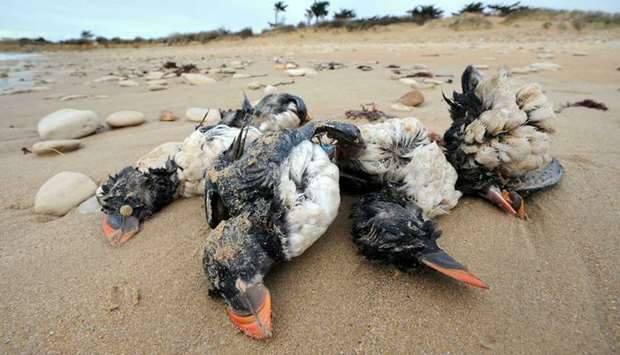Several hundred seabirds have been found dead along the coasts of northeast England and Scotland, while many have been discovered in a condition of emaciation.
The UK Centre for Ecology and Hydrology (CEH), which is investigating the cause of the deaths, said the majority of the birds were guillemots.
Bird carcasses have been found along the Scottish coastline and near shores in Northumberland and North Yorkshire.
Puffins and kittiwakes have also been affected, but on a smaller scale than guillemots and razorbills.
The Royal Society for the Protection of Birds (RSPB) said that while the exact cause remained unknown, the climate crisis was exacerbating the factors that lead to falls in seabird populations.
“Extreme weather, pollution and disease can kill seabirds,” the RSPB said. “If prey fish are scarce, seabirds can be weakened through starvation.”
“We don’t know the exact cause here, but we know climate change is driving prey fish numbers down in our seas and creating more extreme weather events,” the RSPB added. “The world is in a nature and climate crisis, with humans and wildlife already experiencing the impacts. We need urgent action from governments to help revive our world.”
Dr Francis Daunt, an ecologist at the CEH, told the BBC that many of the guillemots had been found starving.
He said: “The birds are emaciated – they are little more than skin and bone, with many half their usual weight, which is catastrophically low.”
Dr Daunt told the broadcaster that there had been “signs that the birds are getting desperate in their search for food”, pointing to sightings of them “feeding very close to beaches in amongst swimmers” despite usually avoiding people.
He said they had also been seen up to 20 miles upriver, which he described as “unheard of”.
In 2015, a study found that the world’s seabird populations had plummeted by 70%, or about 230mn animals, in 60 years.
The study’s lead author, Michelle Paleczny, said seabirds were “a particularly good indicator of the health of marine ecosystems”.
She added: “When we see this magnitude of seabird decline, we can see there is something wrong with marine ecosystems. It gives us an idea of the overall impact we’re having.”
Six of the 25 species of seabird found in Britain and Ireland are on the UK’s red list of birds of conservation concern.

(Representative photo) Extreme weather, pollution and disease can kill seabirds. (AFP)
